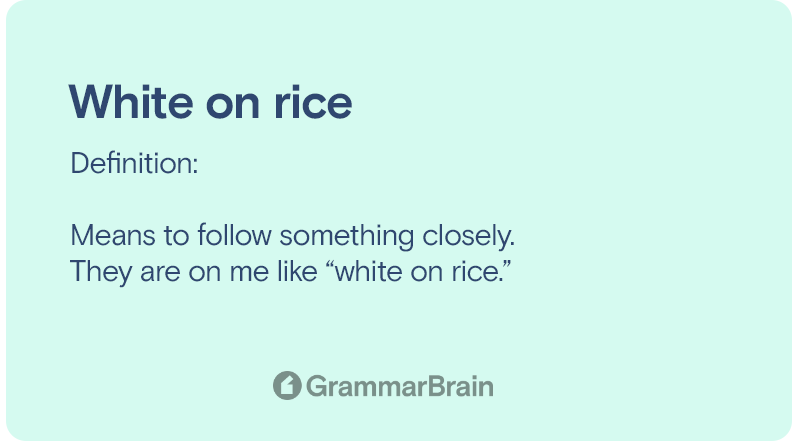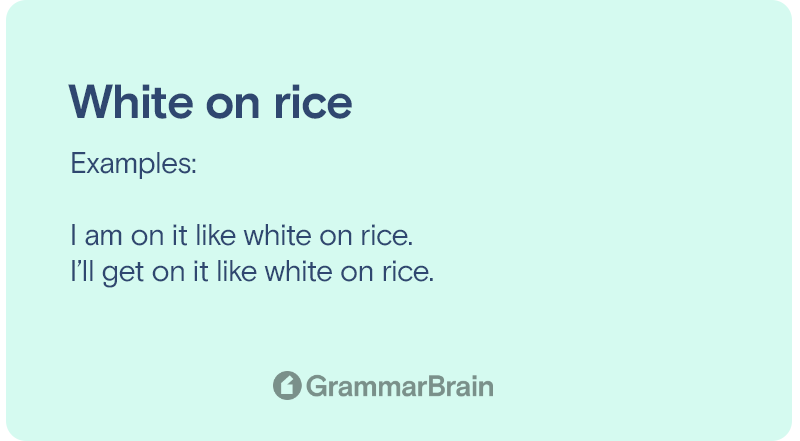What does “white on rice” mean? The English language indeed has some interesting yet very unusual expressions that say something on the surface while meaning a completely different thing. One expression is “White On Rice“.
Do you know what white on rice means? When you can use this phrase? Well, today in this post, we are going to discuss everything you need to know about the idiom.
Let’s have a deeper look at the idiom…

Definition of White On Rice:
The expression means to be close to or on something. A place, thing, or person that is simply all over (or really stuck close to) someone or something else. People generally use this idiom to ascertain an enthusiastic popularity measure. For example, it is used to mean an over-eager mate who always likes to hang around or to mean a crowded cafe.
You can use the idiom by saying, “That girl is all over him like white on rice!” This phrase doesn’t bear any racist definitions and strictly refers to the actual foodstuff i.e. “rice,” which is entirely white.
In other words, you can use this phrase as “A common saying that generally means to be close to or on to something.”
Some people also think it’s a bit of a racial expression because rice is brown, but when it is stripped of the protein to convert it to dog food, it becomes white, which is not the case.

Origin of the Idiom
The source of the expression “Like White on Rice” clearly speculates that this expression originated during the 1900s. Moreover, the term witnessed a significant increase in usage after 1980.
This typically came from the shade of rice. The shade of the rice, and the rice itself, are very closely intertwined. Thus, they’re inextricable. If you’re on somebody like white on rice, you’re watching that individual closely.
The phrase is a simile that demonstrates the characteristic of pervasiveness. For example, “these officers are highly corrupt like white on rice.”
This phrase came into use in the early 1850s when the merchants of rice started to mill original brown rice to extract the germ and husks (along with nutrition) to make the rice less sensitive to spoilage while storing and transporting.
Examples of the Idiom
Example 1:
The following example will show two college-going students using the expression while conversing about an unpleasant acquaintance.
Phoebe: That boy, Billy, keeps following me again.
Rachel: Simply ignore him.
Phoebe: I would love to avoid him, but he is always on me, just like white on rice.
Rachel: Well, then you should directly tell him to give you some space.
Example 2:
Here, 2 friends are having a conversation about the parent-child relationship one of them has.
Ben: Hey Chad, what is the matter with you? Why do you look so sad today?
Chad: Oh! Don’t ask. My parents are coming to visit me today.
Ben: Well, isn’t it something to be happy? Then why are you so tense about it? Don’t you have a good relationship with your parents? Or is it that you don’t like them?
Chad: No. That’s certainly not the case. I like them a lot, and I also love to see them. But the problem is whenever they visit me, they start lecturing me on everything. They are seriously on me like white rice.
Ben: Sorry, I didn’t get you. What does that mean?
Chad: That means both my parents start nagging me and closely follow me everywhere unless I pay attention to their lecture.
In summary
So, the term white on rice means that the case is as tight as anything can ever be. Or we can say that you have got it all covered the way the rice is coated in whiteness (unless it is brown rice or wild rice, or even red rice).
FAQs
What does “white on rice” mean?
By white on rice it means extremely closely intertwined with something.
Often people use it to mean very close physically, but they even use it to mean being involved with something closely.
For example, if someone is white on rice, then the person is watching the other person closely.
Is “like white on rice” an idiom?
Yes, it is an idiom as per the Newton Falls Public Library. It means to be close to or on something.
Inside this article
Fact checked:
Content is rigorously reviewed by a team of qualified and experienced fact checkers. Fact checkers review articles for factual accuracy, relevance, and timeliness. Learn more.
Core lessons
Glossary
- Abstract Noun
- Accusative Case
- Anecdote
- Antonym
- Active Sentence
- Adverb
- Adjective
- Allegory
- Alliteration
- Adjective Clause
- Adjective Phrase
- Ampersand
- Anastrophe
- Adverbial Clause
- Appositive Phrase
- Clause
- Compound Adjective
- Complex Sentence
- Compound Words
- Compound Predicate
- Common Noun
- Comparative Adjective
- Comparative and Superlative
- Compound Noun
- Compound Subject
- Compound Sentence
- Copular Verb
- Collective Noun
- Colloquialism
- Conciseness
- Consonance
- Conditional
- Concrete Noun
- Conjunction
- Conjugation
- Conditional Sentence
- Comma Splice
- Correlative Conjunction
- Coordinating Conjunction
- Coordinate Adjective
- Cumulative Adjective
- Dative Case
- Determiner
- Declarative Sentence
- Declarative Statement
- Direct Object Pronoun
- Direct Object
- Diction
- Diphthong
- Dangling Modifier
- Demonstrative Pronoun
- Demonstrative Adjective
- Direct Characterization
- Definite Article
- Doublespeak
- False Dilemma Fallacy
- Future Perfect Progressive
- Future Simple
- Future Perfect Continuous
- Future Perfect
- First Conditional
- Irregular Adjective
- Irregular Verb
- Imperative Sentence
- Indefinite Article
- Intransitive Verb
- Introductory Phrase
- Indefinite Pronoun
- Indirect Characterization
- Interrogative Sentence
- Intensive Pronoun
- Inanimate Object
- Indefinite Tense
- Infinitive Phrase
- Interjection
- Intensifier
- Infinitive
- Indicative Mood
- Participle
- Parallelism
- Prepositional Phrase
- Past Simple Tense
- Past Continuous Tense
- Past Perfect Tense
- Past Progressive Tense
- Present Simple Tense
- Present Perfect Tense
- Personal Pronoun
- Personification
- Persuasive Writing
- Parallel Structure
- Phrasal Verb
- Predicate Adjective
- Predicate Nominative
- Phonetic Language
- Plural Noun
- Punctuation
- Punctuation Marks
- Preposition
- Preposition of Place
- Parts of Speech
- Possessive Adjective
- Possessive Determiner
- Possessive Case
- Possessive Noun
- Proper Adjective
- Proper Noun
- Present Participle
- Prefix
- Predicate



